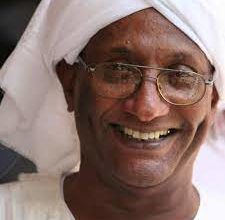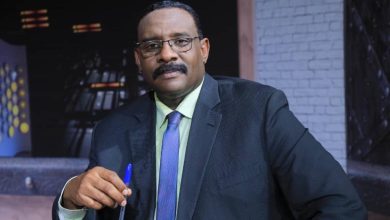North Sector and Heglieg (2012): so this is it?

Abdallah Ali Ibrahim
My difficulties with the forces that have recently formed the Forces for Freedom and Change (FFC) dates back to years. As despite their love for the Sudan to the limit of sacrificing their life on causes related to the Sudan, still this is a love they have to save the Sudan via a tight project such as that of socialism, new Sudan, or civility or modernity or enlightenment.
This has made them nationalist of the caliber, but they missed in their strife for their lofty projects on saving the homeland, a limitless and unconditional patriotism. The patriotism came into Arabic from a translation made by Rufaa Rafie Tahtawi, from the French version of the term. And you would see in past history and you will see in future situation that their amenity for the Kizan or the islamists blinds them against seeing the prerequisites for this patriotism. They are fully engulfed by nationalism, because patriotism is something that cannot be contained. In this article dating back to 2012, I found that the SPLM-North Sector sided with South Sudan when it occupied Heglieg in March 2012 under pretexts that were devoid of patriotism. It was a support without conditions or reasons as you would see.
The day before yesterday, a statement by the SPLM-North Sector was issued, signed by Yasser Arman, on the Heling events. I regret to say that that it was a “Karazaya” statement which means stolen will. I have seen the term used among the Manasir. The people of local choice described those who accepted their relocation by the government as being “Karazayat.” (with stolen will) I was waiting from the Northern Sector, as a political movement “in the state of Sudan,” as he said, for a more relevant and complex statement. None of the opponents of the Ingaz at inside the country wrote his statement about Heglieg without great suffering in extracting the homeland minus the limbs (which the SPLM imposed on us, among others) based on our grievances against the National Congress. Yasser’s statement did not touch upon this conflict between the homeland, democracy, historical Sudan, and change. The statement was an “enlightenment” of moral orientation from the SPLM of South Sudan.
The statement claimed that what is happening in Heglieg is a state of war that has afflicted the National Congress and which will continue to haunt it, always and forever. There is nothing new in Heglieg. This statement was understandable until the separation of South Sudan, because back then, the National Congress was our national deformity both of us. Now that the South has become a foreign state, it should defend itself, whenever the National Congress attacks it, according to the recognized international principles that the international community is currently demanding that it adheres to. Perhaps Sudan was still one in Yasser’s mind, even if it evaporates altogether as the saying goes. This is an ideological illusion that brings it closer to the Islamic Liberation Party, which still believes in the Islamic Caliphdom. A Man would require to have a stone cut memory in order to continue believing in the new Sudan after what has happened. Sudan is a new homeland. This should make Yasser’s movement “country-based”, in the least possible judgement. It must take into consideration is homeland, and its people no matter what the situation.
Yasser’s Statement returned to self-pitying history. Heglieg, as he said, is not the first piece to be peeled away from Sudan. Take for example: Halaib and Al-Fashqa. The statement denounced the fact that the National Congress party (Sudan) was lamenting the fate of Heglieg in a way that it failed to do with regard to the other areas. This could not be understood. The fact that the National Congress did not cry over them does not mean that we did not cry. This people cry and mourn, until time for action comes. On the other hand, we did not hear any crying or lamentation from SPLM over Halaib or Al-Fashqa while it has been in power for five years, nor did Yasser’s presidential program carry their grievance. Of course, we can say why South Sudan cried over Heglieg and not at the Ilemi Triangle on its border with Kenya. One is puzzled by the extremes we will reach when the idea prevails in us that Heglieg is remediable question, watch for Halayeb and Al-Fashqa. In simple words: We will observe an open national day of mourning for Sudan. Come on, neighbors and non-neighbours, snatch whatever you could from the
Sudanese peripheries so that it would regain Al-Fashqa and Halaib. What a lesson!!
As for the third point, it is Yasser’s logic in revolutionizing us, the Sudanese people, to rise up and eliminate Ingaz. In his opinion, the National Congress does not cry over Heglieg, but rather over its oil, which it uses for local consumption and bringing in foreign exchange. He added that the Revolutionary Front (the only time he mentioned it in the statement) would eliminate what remained of the National Congress “of oil so that the Sudanese people could overthrow Ingaz, repair relations with all neighboring countries, repair North-North relations first, and build a homeland that accommodates everyone.” Is this it Yasser? Have you given up hope in us we should revolt in pursuit of freedom, truth, and beauty? And you wanted to “bring us down on our knees” begging for change, humiliated, and cramped in lines for gasoline and bread? Will Yasser’s promised homeland be enough for us as citizens when we come to it as subjects emptied of meaning and broken-minded? How much did Yasser break his promise to that desired country? Is this submission a condition for uprising, according to Lenin?
Yasser: Do you want a government you hate or a country you love? See how hatred for the regime drove you to promote for a revolution like hard labor.



